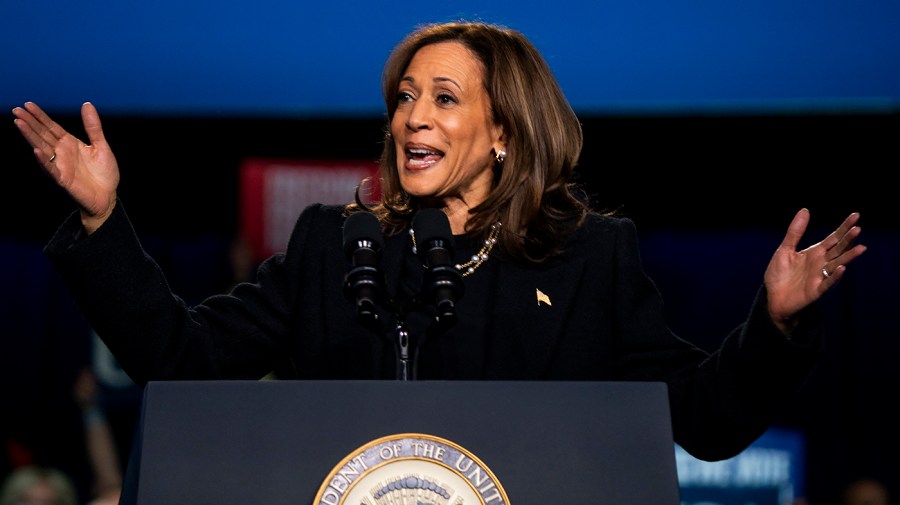Momentum has slightly shifted to Vice President Harris ahead of Election Day in her matchup against former President Trump, according to several major election analysts, but she’ll need a strong showing in key states to get to 270 electoral votes.
The conclusion from all of the major analysts emphasizes just how close the race is and that either side could pull off a win, but Harris’s prospects have seemed to tick up a little bit in the final days of the campaign.
The forecast model from Decision Desk HQ, which partners with The Hill, has been among the more stable in terms of determining each candidate’s probability of winning. The model gives Trump a 54 percent chance of winning as of Tuesday afternoon.
Harris had been the favorite in the DDHQ model throughout most of her campaign until Trump became slightly more favored in mid-October.
Other election models name Harris the favorite, although the difference between any of them is only marginal at most.
The vice president took back the smallest of leads in the final forecast model from FiveThirtyEight after weeks of being the slight underdog. She is projected to have a 50 out of 100 chance of winning compared to Trump’s 49 out of 100 chance.
She has remained favored to win the popular vote by at least 2 points through most of the campaign, but she is forecast to win exactly 270 electoral votes, the minimum needed to win, to Trump’s 268. But she hasn’t been projected to win more than Trump in the model since Oct. 17, two and a half weeks ago.
Among the most optimistic models for Harris, The Economist’s simulations gave Harris the win in 56 out of 100 scenarios on Tuesday, up from a 50-50 split the day before. Trump was ahead in that model before those findings.
The model from Split Ticket, another election forecaster, gives Harris a 53 percent chance of prevailing, holding steady from its forecasts in late October. Like FiveThirtyEight, Harris is projected to most likely receive 270 electoral votes.
These final forecasts come after a handful of uplifting polls and some positive news cycles for Harris in the waning days of the 2024 cycle.
National polls have been a bit mixed in the last couple weeks, but most analysts still give Harris a slight advantage nationwide. Harris saw the largest national lead for either candidate recently from a PBS News/NPR/Marist poll released Monday that had her ahead of Trump by 4 points.
But the biggest stunner in polling, perhaps from the entire cycle, came on Saturday with the release of the final prestigious Des Moines Register/Mediacom survey of Iowa that found Harris leading Trump by 3 points, 47 percent to 44 percent.
The state was, and mostly still is, expected to vote for Trump comfortably, but the poll was notable because observers viewed it as a strong indicator of how Iowa and the country as a whole may vote.
Given the political makeup of Iowa, it could also give some signals about how other states with similar demographics might vote.
Pollster J. Ann Selzer, who runs the poll, is considered one of the best pollsters in the country, and her final statewide polls of Iowa have been generally spot on for more than the past decade.
But maybe an even bigger takeaway from the poll was Harris’s lead with independent women by 28 points and women 65 years old and above by 35 points. If either of those numbers are similar in other critical battleground states, Harris could be in for a good night.
Harris also received a reassuring result from a Univision and YouGov poll of Latino voters, a key constituency in the Democratic coalition that Republicans and Trump have sought to make gains with.
The poll showed Harris leading among Latinos in Pennsylvania by 34 points, a big lead that if it holds could give Harris the Keystone State.
The result came after the Trump campaign faced blowback from critics over a comment that comedian Tony Hinchcliffe made at a rally at Madison Square Garden calling Puerto Rico a “floating island of garbage.” Trump sought to distance himself from the comedian, but the firestorm continued.
The poll found almost seven in 10 respondents said the joke was “more racist than humorous,” and six in 10 said Trump is very or somewhat disrespectful toward Latinos.
How much the moment, or President Biden’s comment responding to the incident, will ultimately affect voters’ decisions is unclear, but even small shifts could be the difference between who wins.
While veteran pollster Nate Silver also gave Harris the slight edge in his final forecast, he appropriately called the race “literally closer than a coin flip.”
In 80,000 simulations of his model, Harris won in 40,012, while Trump won in 39,718 of them and the rest resulted in a 269-269 Electoral College tie. The number that Harris won is equal to 50.015 percent of the total simulations, but heads wins in a coin flip 50.5 percent of the time, making the race closer than that.
“When I say the odds in this year’s presidential race are about as close as you can possibly get to 50/50, I’m not exaggerating,” Silver said.

